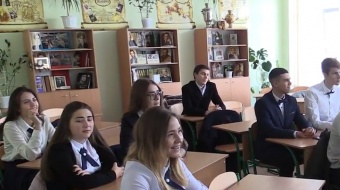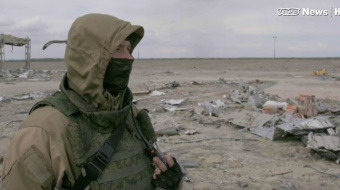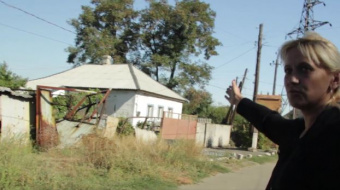Perished children of Donbas. War without censorship. Part 1
Perished children of Donbas. War without censorship. Part 1
Hundreds of children have suffered since the beginning of Russian aggression in the Donetsk and Luhansk regions.
On June 1, International Children’s Day, Andriy Parubiy, Chairperson of the Verkhovna Rada, voiced the data about 68 perished children and 186 wounded ones during the two years of war. At the same time, other sources claim that the number is even more tragic: Andriy Pavlenko, children’s ombudsman of the times of Yanukovych, states that 199 children have died and 500 children have been wounded by bullets or pieces of shells. About 10 thoгsand little Ukrainian citizens live in the “grey zone” and risk their health and lives every day.
This interview with Nataliya was recorded a year ago.
On June 27, 2014, the woman lost her 23-year-old daughter Khrystyna and 10-months-old granddaughter Kira.
She does not care much about discrepancy in statistics, the most painful thing for her as a mother today is not to know the truth: who is guilty of her children’s death.
Neither Ukraine, nor the Russian Federation, nor the so-called “DPR authorities” have started investigating into the circumstances of Horlivka central square shelling.
Natalya’s case has been sent to the European Court on Human Rights (Article 2, “The right to life” of the Convention of the Human Rights and Fundamental Freedoms).
Natalya and her lawyer hope that the decision of this court will push Ukraine to investigate the situation. They say that a fair and transparent trial is important not only to Natalya, but to all the families who have lost their children in this war.
Natalya’s direct speech is below.
The first kiss.
We lived in the centre on the seventh floor, our balcony was glazed and you could see all the town from it. In the morning, a pigeon family was crooking, raindrops were drumming on the window sill and festive fireworks seemed to be landing on your extended hand. The square, schools, roads, people — all that was in your window, mixed with linden and acacia fragrance...
When children grew up, they waved me “goodbye” through that window in the morning. Then, my girls grew up and started going out with boys. I used to peek from behind the curtain when they were leaving. Kira, my granddaughter was born some years later and we learnt the world together with her, stretching our hands to the sun and tasting raindrops...
All our life in Horlivka was concentrated around the square. Our school, universities, hospitals were near it. Kira arrived from maternity home via that square as well.
During Euro 2012, Khrystyna could not return to Horlivka from Donetsk. Foreigners stopped them, asked to show the city, to tell them about it...
Khrystyna was fascinated by people. She spoke English fluently and showed them our Donetsk, our river, our rosaries. She phoned home and said: “People want to see our city and listen to its history, I will stay here...”
She loved life so much. She used to say: “I will have enough time for everyhting, I will manage everything...” When she was choosing a name for her daughter, she read that “Kira” meant “Granny’s favourite”. She had no doubts how to name her daughter.
We used to go for a walk in the square in the morning, everything was for the first time for Kira — snow, grass, dandelions, soap bubbles.
Kira was making her first steps. There was a boy named Romka in the square. He ran up to her, hugged her and started kissing. Kira got scared. We could not make him let her go. Romka said: “She’s nice.” As soon as we turned away, he came up to her again. Dasha managed to take a picture of them. Kira’s first kiss. The first and the last one.
In two days we will be killed.
Those were the last photographs where we were together.
Dasha was leaving as she had to take exams in Kyiv and at that time they started shelling us. When I was telling Khrystyna that we had to go away, she would answer me: “Mum, calm down. Where can we go? Do you believe in this war?”
We would joke that in case of a shelling we would not run home and would see each other in the bomb shelter. We never said it seriously, of course.
At night we were afraid to stay at home. We brought all the necessary things like thick blankets for Kira to our bathroom - to cover her with them in case of a shelling. Every night we would discuss which wall would be the safest to sleep under. We were so stupid then...
No one was afraid to go out into the town, we could not even imagine that they would start shelling us in the middle of the day. We were afraid of nights.
In the morning we always smiled at each other. We were happy to see our family.
Last nights were getting more and more horrible. We heard that shells were flying to and from the town, but those were outskirts at that time.
No one believed that! I tried to trick my daughter and I told her: go to visit Dasha in Kyiv, you will have some rest for a week and see the city. I had another plan as well: my clothes and Kira’s ones had already been packed, I thought that as soon as my daughter would leave, I would take the suitcase and follow her.
But in the morning there was a doorbell. Those were Dasha and Krystyna. My heart sank... And Khrysyna was grumping: “I am not going to Kyiv and who had this idea about having a rest? What should I have a rest from? From looking after my child?”
New service "Explain Ukraine". This is a daily mailout of two articles which were written about the situation in the Donbas by Donbas journalists and translated into English. Honest vision of people who work in the field is unbiased and fresh which is crucial in the world which is full of desinformation and propaganda. We try to share this vision in out daily mailout. You can subscribe here.













